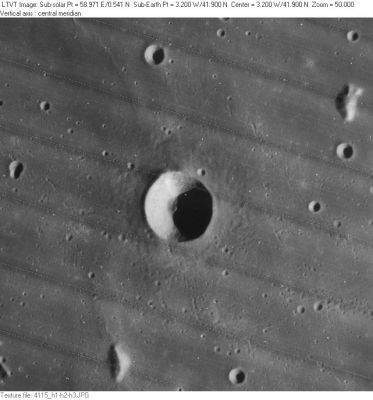Piazzi Smyth
Contents
Piazzi Smyth
|
Lat: 41.9°N, Long: 3.2°W, Diam: 13 km, Depth: 2.53 km, Rükl 12 |
LO-IV-115H Several of the smaller craters in this view are named satellite features of Piazzi Smyth. In the original IAU nomenclature, the small hill in the upper right was known as Piazzi Smyth Alpha while the one near the bottom margin was Piazzi Smyth Beta. Both names were dropped in 1973.
Images
LPOD Photo Gallery Lunar Orbiter Images Apollo Images
Although there seems to be nothing in the LPI's database for orbital Apollo photographs of Piazzi Smyth, this crater WAS photographed by the Fairchild mapping-metric camera of Apollo 15! One of these oblique northward looking Fairchild frames is AS15-M-1543, with Piazzi Smyth near the very centre and most upper part of the curved horizon! The mountain immediately behind Piazzi Smyth is probably the one at 48°30' North/ 3° West (of which its northern part is depicted at (and near) the lower margin of Antonin Rukl's chart 4, and its southern part at (and near) the upper margin of his chart 12).
Research: Danny Caes
Maps
(LAC zone 25A3) LAC map Geologic map
Description
Description: Elger
(IAU Directions) PIAZZI SMYTH.--A conspicuous little ring-plain, 5 or 6 miles in diameter, depressed about 1,500 feet below the Mare Imbrium, with a border rising about 2,000 feet above it. With the curious arrangement of ridges, of which it is the apparent centre, it is a striking object under a low sun.
Description: Wikipedia
Additional Information
- Depth data from Kurt Fisher database
- Arthur, 1974: 2.53 km
- Westfall, 2000: 2.53 km
- Viscardy, 1985: 2.53 km
- From the shadows in LO-IV-115H, Piazzi Smyth is 2470-2570 m deep. - JimMosher
- A profile of the crater is available in an article published by Steve Boint in the Spring 2007 issue of Selenology: Journal of the American Lunar Society. - fatastronomer
- TSI = 10, CPI = 15, FI = 10; MI =35 Smith and Sanchez, 1973
- Examination of the Lunar Reconnaissance Orbiters (LRO's) HiRes close-up photography of satellite crater Piazzi Smyth V' (about halfway between Piazzi Smyth itself and southwestern Kirch) reveals a curious "Schiller-like" look with central "spine" on its floor.- DannyCaes Jun 23, 2012 Could we call it a Mini-Schiller ?
- Piazzi Smyth W', a small satellite crater immediately south of the hillock once known as Piazzi Smyth Alpha (east-northeast of Piazzi Smyth itself), looks deceptively "concentric" on the Lunar Reconnaissance Orbiters (LRO's) medium-resolution photographs. However, HiRes close-up photography reveals a curious ring of boulders about halfway of the craterlet's upper rim and floor, which shows up as some sort of "pseudo-concentric tendency" on Med-Res images.- DannyCaes Jun 23, 2012
Nomenclature
- Named for Charles Piazzi Smyth (January 3, 1819 – February 21, 1900), Astronomer Royal for Scotland from 1846 to 1888, and well-known for many innovations in astronomy and his pyramidological and metrological studies of the Great Pyramid of Giza.
- This crater was named, jointly with the Teneriffe Mountains, in honor of the astronomer and his experiments there testing Newton's hypothesis that the deleterious effects of the Earth's atmosphere could be lessened by observing from the tops of high mountains: "The crater "Piazzi Smyth" is named, with the Teneriffe Mountains, to commemorate "An Astronomer's Experiment."(Lee, 1864)
- Charles Smyth was the son of William Smyth after whom Mare Smythii was named at the same time. The name Piazzi Smyth is unusual in that "Piazzi" is a middle name, honoring the elder Smyth's friend, and Charles' godfather, Italian astronomer Giuseppe Piazzi. The only other example of an IAU lunar crater name that is a combination of the honoree's middle and last name would seem to be Spencer Jones. In both cases, the honorees appear to have been widely known by this combination during their lifetimes. - JimMosher
- The feature is Catalog number 1125 in Blagg's Collated List, where it is noted that the same crater was known as Pico A in Beer and Mädler.
- The name Piazzi Smyth (used in Neison, 1876 and noted by Julius Schmidt) was adopted for the original IAU nomenclature of Named Lunar Formations. It is attributed to Birt.
- Not to be confused with Piazzi.
- The wrinkle ridge running north-northwest of Piazzi Smyth (touching the north-northwestern part of its rim) is unofficially called Dorsum Piazzi Smyth by - DannyCaes Aug 21, 2011
- Satellite crater Piazzi Smyth V is nicknamed Mini-Schiller by - DannyCaes Jun 23, 2012
LPOD Articles
40 years later (drawing and photograph of the Piazzi Smyth region, by Leo Aerts).
Bibliography
- Eggen, Olin J. 1955. Charles Piazzi Smyth. Astronomical Society of the Pacific Leaflets, Vol. 7, p. 97.
- Lee, J. 1864. "On the Lunar "Mare Smythii," the walled Plain "Rosse," the "Percy Mountains," and the newly named Craters, "Phillips," "Wrottesley," "Chevallier," and "Piazzi Smyth." Report of the British Association for the Advancement of Science 1863 Meeting. Notices Section (at end), pp. 7-9 (the name is also used in on p. 4, in an earlier article by W. R. Birt).
